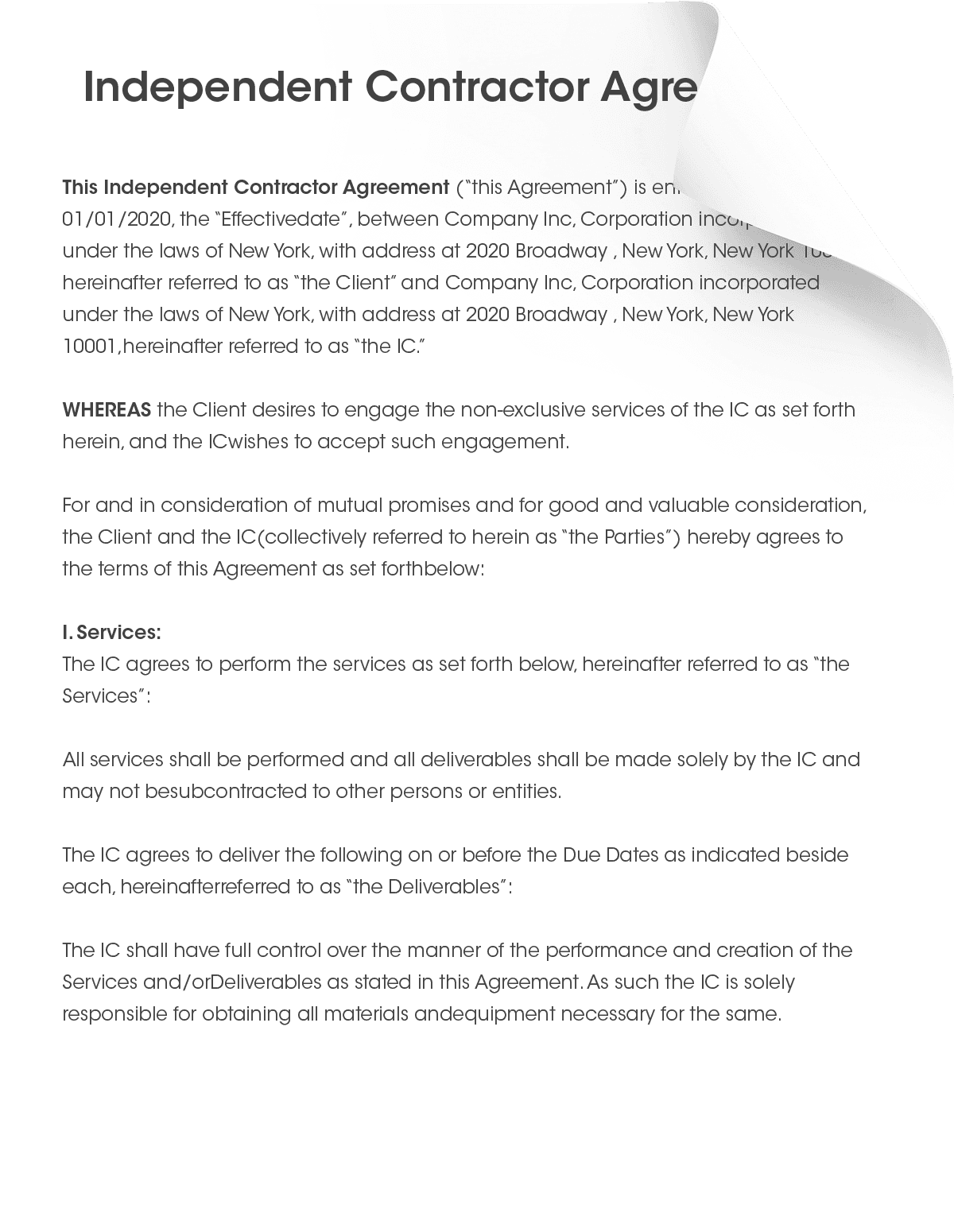What Is an Independent Contractor Agreement?
A contractor agreement is a document that defines the terms and conditions of hiring an independent contractor.
Both parties – the employer and independent contractor – are present when this document is drawn up and signed. This ensures that everyone is on the same page and helps to reduce the risk of conflicts. A contractor agreement is also helpful for setting expectations for the terms of employment.
It’s a similar document to a subcontractor, freelancer, or service agreement.
What Is an Independent Contractor?
An independent contractor is a self-employed individual or business that offers services or products to another company in exchange for payment.
The Internal Revenue Service (IRS) defines an independent contractor as someone who has total control over how they complete work for clients. Employers typically don’t have much of a say in the process.
A person’s independent contractor status is also classified based on whether they receive any employee benefits and whether they are reimbursed for expenses or supplies used during the project.
If they receive any benefits, they will usually be classified as employees. These benefits may include:
- Health care and insurance.
- Access to a pension fund.
- Social Security contributions.
Many companies may prefer hiring an independent contractor because many extra responsibilities – not to mention expenses – are attached to hiring an employee.
Hiring an independent contractor may therefore be a more cost-effective option for some businesses.
This is because employers avoid paying employee taxes and contributions to Medicare and other insurance schemes.
Why Is It Important to Know the Difference Between an Independent Contractor and an Employee?
As an employer, it’s important to understand the difference between independent contractors and employees. Misclassifying an employee can result in costly legal consequences that can be damaging to your business.
Let’s take a closer look at the key differences between an independent contractor and an employee.
Employee
An employee is an individual that is employed by the company on a full-time basis. Employees have to sign a contract that details the following:
- The type of work they will be doing.
- Where they will be working.
- What their working hours are.
- Their salary or wages.
The above mentioned elements are usually predetermined by the employer. Employees also often receive a number of benefits that may include health care and pension. Some employers will file taxes on behalf of their employees, too.
Independent Contractor
An independent contractor operates separately from individuals or businesses that employ them. Even though they will also sign contracts when doing jobs for businesses, independent contractors usually choose their own terms. Independent contractors also have to rely on their own tools, equipment, and any other supplies they might need to complete a job.
To receive payment for services provided, an independent contractor must submit an invoice for the completed work. An independent contractor is also responsible for their own taxes because they aren’t formally employed by their clients.
Why Do You Need to Use an Independent Contractor Agreement?
The main reason for having a contractor agreement is to minimize the risk that comes with working with independent service providers.
These risks include financial liabilities and even quality control issues if you’re not careful. You can also use a contractor agreement to do the following:
- Setting expectations: A contractor agreement provides an in-depth explanation of the expectations and parameters of the work that needs to be done. It also details the compensation, expected workflow, and communication methods. By drawing up this contract, you can avoid confusion between you and the independent contractor.
- Affirming employer-contractor distinction: Contractor agreements help employers to make a clear distinction between their full-time employees and independent service providers. Not only does this protect the business from false employment claims that can arise, but it also reaffirms the duties of the independent contractor.
- Defining work-product ownership: Independent contractors usually take full ownership of the work they do for employers. They should also actively protect any trade secrets and key business information. However, this should still be made clear in the contractor agreement to avoid costly legal actions in the future.
When Do You Need to Use an Independent Contractor Agreement?
You will need a contractor agreement whenever you hire an independent contractor, or if you are self-employed and will be contracted as one.
The agreement is based on the specific terms of each work engagement.
Are There Deadlines or Times When the Form Is Needed?
There are no official deadlines attached to a contractor agreement. In fact, you can even have one signed when you’ve already started with the job, although this isn’t recommended.
Ideally, you would want to have the contractor agreement drawn up and signed as soon as possible – preferably before anyone starts working. This helps to ensure that everyone is on the same page regarding project expectations, workflow, and compensation—without anyone’s interests being compromised later on.
Having a contractor agreement finalized before the person starts providing their service can also prevent conflicts from arising.
What Are the Main Things That Go on This Form?
Apart from the employer and service provider’s details, the contractor agreement should include the following:
- A description of the work to be done or of the deliverables.
- The location where the work will be done.
- Time frame or deadlines for the work to be done or duration of the engagement.
- Compensation details, including the billing rates and frequency of payments.
- Additional charges and conditions for deposits or advanced payments.
- Late payment penalties, if any.
- Agreement terms—including termination processes, reimbursements, intellectual property rights, and confidentiality.
The following are some other clauses that are not necessary, but are great to have in your independent contractor agreement:
- Any additional clauses that relate to the nature of the job—including indemnity, return of property, legal expenses, and liability.
- Intellectual property assignments.
- Choice of law and jurisdiction.
- Penalty clauses.
What Are the Most Common Mistakes to Avoid?
Drawing up an entire agreement can seem like a daunting task and it can be easy to make mistakes if you’re doing it for the first time.
In this section, we’ll take a closer look at common mistakes people make when creating a contractor agreement and how you can avoid them.
Not Having an Independent Contractor Agreement
It might seem obvious, but not having an independent contractor agreement can become a big and costly mistake for both employers and service providers. Without a written document that details every aspect of the job, it can be difficult to prove what you agreed upon in the first place.
Failing to Clearly Define the Terms of Employment
Failing to specify the terms of employment is often just as bad as not having an agreement in place at all. It’s important to set expectations for the final result and agree on terms like compensation, deadlines, and scheduling. Both parties should be in full agreement. The specifications, however, don’t have to be overdone. For example, you don’t need to include a step-by-step process of how payments will be made. Simply stating the requirements for making payments and setting up a schedule is usually good enough.
If an employer over-specifies the details of a project, it might also prevent the independent contractor from applying their own knowledge and demonstrating their expertise freely.
Not Specifying Ownership of Intellectual Property
This is a very common problem when hiring independent contractors—especially when it comes to copyrighting intellectual property. Most businesses have processes in place for copyrighted materials like photos and graphic designs. However, according to the law, the author becomes the owner of the copyrightable material from the time it is created. This means that the independent contractor is technically the owner of any copyrightable material they create for your business.
You can avoid this problem by including a clause in the contractor agreement that states that the business will be the owner of the intellectual property.
Of course, the independent contractor will have to agree to this clause. They have to be made aware of its existence when they sign the contract – otherwise your business can be sued.
Misclassification
As we’ve discussed above, this comes about when treating and paying a worker as an independent contractor when the government classifies them as an employee.
Having the contractor agreement will not decide the classification by itself, but it will help to provide some clarity.
If the worker should be an employee, it would be best practice to hire them as such.
Do I Need A Lawyer, Accountant, or Notary to Help Me?
You don’t need to hire any legal person to help you draw up an independent contractor agreement. Although they might be able to help you avoid mistakes, their services can be expensive.
Luckily, there are many other cost-effective ways to create your own independent contractor agreement template.
One way is to use legally binding online tools like Form Pros. Our free contract agreement template generator helps you to create error-free documents in minutes.
Why Use the Form Pros Independent Contractor Agreement Template?
The key to a good contractor agreement is being able to include and agree on all the things that matter.
Our free independent contractor agreement form generator will help you do this by taking you through the important stuff, including those aspects you may not even have been thinking of. This way, there is a significantly lower chance that you will miss something.
Our online tools are also easy to use and affordable, helping you to create professional documents in minutes. Take the hassle out of creating a independent contractor agreement with Form Pros, today.





